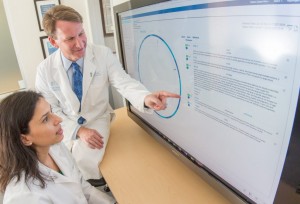Watson Health
As Seen On 60 Minutes: Watson Accelerates Precision Oncology
October 9, 2016 | Written by: Norman Sharpless, MD
Categorized: Watson Health
Share this post:
Oncologists spend each day fighting a disease that is cruel and relentless. Yet, we find deep fulfillment from helping give a patient time they might not have had, and helping them achieve a good quality of life amid challenging circumstances.
That’s what drives me every day in my work developing new approaches to cancer treatments. Cancer genomics is a highly complex biological science – and it’s a science that is advancing extremely rapidly. New science emerges daily – last year there were 160,000 new cancer studies in PubMed, and every month about 100 new clinical trials launch in the U.S.

Oncologist, Dr. Norman Sharpless, and pathologist, Dr. Nirali Patel, of the University of North Carolina Lineberger Comprehensive Cancer Center review cancer treatment insights from Watson for Genomics.
While the core of cancer genomics is centered in biology, the practical application of these advances has increasingly become a bioinformatics challenge. How are we as expert clinicians to stay on top of a field that is changing under our feet? This is where Watson has demonstrated its value.
At the University of North Carolina’s Lineberger Comprehensive Cancer Center, our Molecular Tumor Board has been meeting weekly to discuss patient cases, about 20 patients each week. Made up of oncologists, pathologists, biologists and other experts, the committee needs current information on the latest, most effective therapies and available clinical trials for each type of cancer and mutation.
To address this need, we assign cancer specialists to focus on a specific cancer type, and they work diligently to know their disease area inside and out so that we can personalize each patient’s care based on the DNA mutations that drive their tumors, as well as knowledge of the latest available breakthroughs.
But despite this incredible expertise and diligence, this approach remains limited. The Molecular Tumor Board’s scale, even with the time and input of 30 experts, is limited to about 20 patients each week. If a tumor board member is absent from a meeting, we lose critical knowledge that week. And with thousands of medical papers being published each week, staying up to date on the rapid pace of clinically relevant advances is an impossible human task. Striking discoveries can be missed for months or longer because the reality is, these experts have time to read 2-3 papers a day during an era when there are some 8,000 new papers a day.
But Watson can help us keep up with it.
We’re now using Watson as a standard part of our tumor board process because Watson is able to perform a task for which humans are poorly suited: staying up with enormous amounts of clinical knowledge. The system constantly learns through its analysis of recent studies and clinical trials, and it is tireless. Equally important, it provides this aggregated information in an organized way that our tumor board can use to inform patient care.
We know the value of this approach because we have studied it using actual patient cases. Watson for Genomics analyzed more than 1,000 recent UNC Lineberger cases. In many instances there was “no standard of care” for these patients – the known therapies had failed them or they didn’t yet exist. When we compared the output of Watson’s analysis with those of the human tumor board, we learned that Watson identified the same potential therapies as the tumor board 99 percent of the time. More importantly, in nearly 300 patients, Watson found clinically-actionable information that had not been identified by the humans working without Watson’s help. That means one-third of the patients potentially had more options available to them with Watson’s help.
In some ways, the experience was humbling but not surprising. We were all aware of the limitations of humans with regard to this task, and therefore we were very excited to identify how cognitive computing could help in the treatment of cancer patients. I believe systems like Watson represent a breakthrough that will allow us to scale access to precision cancer treatments. Our experience demonstrates that technology platforms, such as Watson, can help us process and review information more effectively and efficiently.
For patients who have no standard-of-care options, or for whom the standard-of-care has failed, precision medicine provides a ray of hope. While not effective in all patients, targeted therapies that specifically tackle the cancer-causing genetic mutations hold promise to provide significant benefit in some patients. The reality is that precision oncology is not necessarily about curing cancer – it’s about finding an effective treatment for a patient without a clear next therapy in order to make a difference. To provide them and their loved ones the gift of time.
Patients want to know “will this treatment cure me?” It’s a hard question to answer. But with molecularly stratified information, we believe we can do better by our patients.
At present, there is a narrow group of people for whom precision medicine will impact outcomes. Perhaps less than 10 percent of patients. But when 7.6 million people are dying from cancer in the United States each year, extending or bettering the quality of life for even a small portion of this number is well worth the effort.
As caregivers, if you plan on using genomic sequencing to determine cancer therapies, you should consider using an information technology platform to inform your decisions, as we did with Watson. Even humans who are the best of the best will sometime err; there are insights humans will miss. What we’ve realized at UNC Lineberger is that when a technology exists to give patients a better fighting chance, it’s our obligation to use it.
_____________________
Related Coverage:

Director, University of North Carolina Lineberger Comprehensive Cancer Center
Alleviating the Burden of Diabetes with AI
How many decisions do you make per day? From the minute you wake up in the morning until you fall asleep that same evening, you likely have to make endless choices: the route you drive to avoid traffic, what you should order for lunch, when to run errands, what type of exercise you want to […]
Watson Health: Setting the Record Straight
We at IBM have a lot to be proud of, including our pioneering work with Watson Health. Unfortunately, some media reports, including an August 11th story published by The Wall Street Journal, distort and ignore facts when suggesting IBM has not made “enough” progress on bringing the benefits of AI to healthcare. I feel it […]
Addressing Barriers in Health Equity in Cancer with Technology
Like many doctors, I became a physician to care for those who needed it most. That motivation is central to my whole career. It’s why I worked in community health centers for underserved communities in Baltimore and Washington, DC, and pushed initiatives to eliminate health disparities when I worked at the National Institutes of Health. […]


